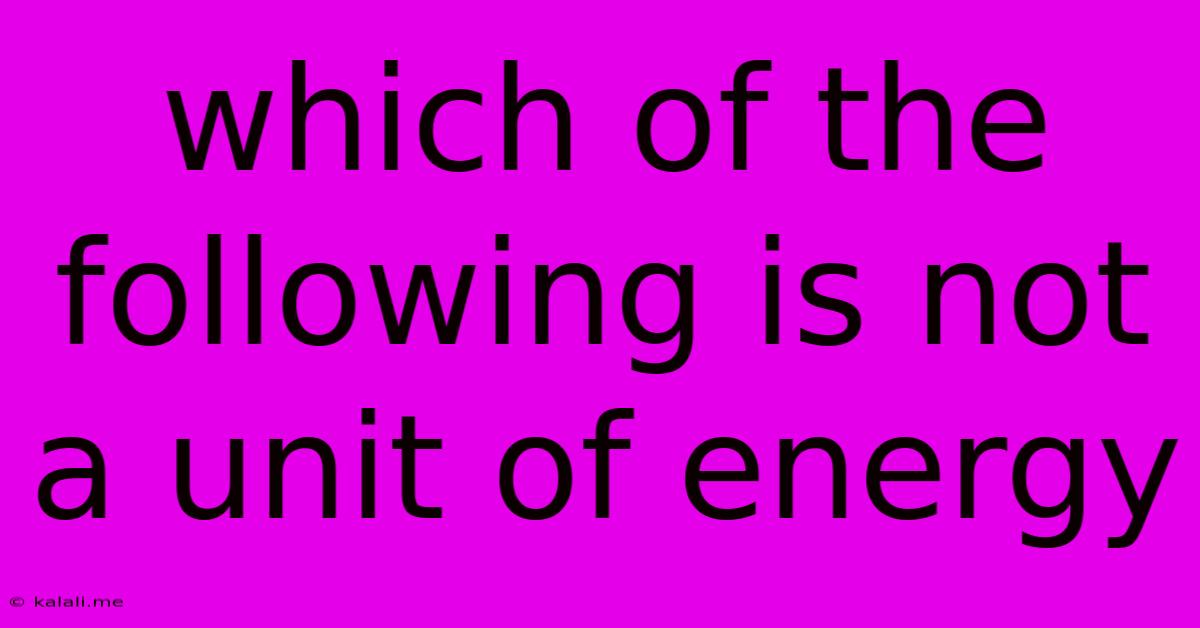Which Of The Following Is Not A Unit Of Energy
Kalali
Jun 14, 2025 · 3 min read

Table of Contents
Which of the Following is NOT a Unit of Energy?
This article will explore various units of energy and definitively answer the question: which of the following is not a unit of energy? We'll delve into the definitions of common energy units and highlight their applications, ultimately clarifying the one that doesn't measure energy. This will be useful for students, scientists, and anyone interested in understanding the fundamental concepts of energy measurement.
Understanding units of energy is crucial in physics, engineering, and many other scientific disciplines. Accurately measuring and converting between these units is essential for solving problems and interpreting data. This article will help solidify your understanding of these important concepts.
Common Units of Energy
Several units are used to quantify energy, each suited to different scales and contexts. The most common include:
-
Joule (J): This is the SI (International System of Units) unit of energy. It's a fundamental unit used extensively in physics and engineering. One joule is defined as the work done when a force of one newton is applied over a distance of one meter.
-
Calorie (cal): Often used in nutrition and chemistry, one calorie is the amount of energy needed to raise the temperature of one gram of water by one degree Celsius. Note that the "calorie" used in food labeling is actually a kilocalorie (kcal), equal to 1000 calories.
-
Electronvolt (eV): Primarily used in atomic and nuclear physics, one electronvolt is the energy gained by a single electron when it accelerates through an electric potential difference of one volt. It's a very small unit of energy.
-
Kilowatt-hour (kWh): This unit is commonly used for electrical energy consumption. It represents the energy consumed when a power of one kilowatt is used for one hour. It's a practical unit for measuring household energy usage.
-
British Thermal Unit (BTU): This unit is used in some engineering applications, particularly in the United States, and represents the energy needed to raise the temperature of one pound of water by one degree Fahrenheit.
-
Erg: A smaller unit of energy belonging to the centimeter-gram-second (cgs) system of units.
The Imposter: Identifying the Non-Energy Unit
While all the above units measure energy in different contexts, there's a common trick question that involves a unit that doesn't measure energy. Often, the question might present a list including units like Joules, Calories, and Watts.
Watts (W) is the unit of power, not energy. Power is the rate at which energy is transferred or converted. Power is measured in Joules per second (J/s). Therefore, while closely related to energy, a watt does not directly measure the amount of energy itself. It measures how quickly that energy is being used or produced.
To illustrate, imagine two light bulbs: one 60-watt bulb and one 100-watt bulb. The 100-watt bulb uses energy faster (more power) than the 60-watt bulb, but both could use the same amount of energy over a period of time, depending on how long they are turned on.
Conclusion: Watts are Not a Unit of Energy
In summary, while watts are inextricably linked to energy, they measure the rate of energy transfer, not the quantity of energy itself. Therefore, watts is the unit that is not a unit of energy among the commonly presented options. Understanding the distinction between energy and power is vital for a clear grasp of fundamental physics and engineering principles. Always remember to consider the context in which these units are used to avoid confusion.
Latest Posts
Latest Posts
-
Parts Of Four Stroke Petrol Engine
Jun 15, 2025
-
Which Of These Storage Devices Provides The Highest Capacity
Jun 15, 2025
-
The First Step In The Problem Solving Process Is To
Jun 15, 2025
-
Routers Operate At Which Osi Layer
Jun 15, 2025
-
Is Moment The Same As Torque
Jun 15, 2025
Related Post
Thank you for visiting our website which covers about Which Of The Following Is Not A Unit Of Energy . We hope the information provided has been useful to you. Feel free to contact us if you have any questions or need further assistance. See you next time and don't miss to bookmark.